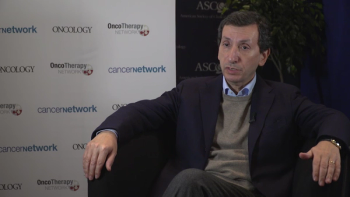
Survivors of childhood Hodgkin lymphoma had more chronic and severe cardiovascular health conditions at age 50 vs a group of controls.

Your AI-Trained Oncology Knowledge Connection!



Survivors of childhood Hodgkin lymphoma had more chronic and severe cardiovascular health conditions at age 50 vs a group of controls.

High-dose chemotherapy with autologous stem cell transplantation was effective in treating patients with newly diagnosed primary CNS lymphoma.

The FDA has granted Breakthrough Therapy Designation for injected daratumumab added to standard-of-care treatment regimens among patients with relapsed or refractory multiple myeloma.

Juno Therapeutics has reopened the phase II clinical trial (ROCKET trial) of JCAR015 in adult patients with B-cell acute lymphoblastic leukemia following three deaths.

A new study found that monitoring of minimal residual disease in a group of elderly patients with multiple myeloma proved to have important prognostic value, regardless of patient age or cytogenetic risk.

The advantage of treating low- or intermediate-risk APL with ATRA plus arsenic trioxide appears to increase over time, according to results of the APL0406 trial.

Results of a single-center analysis indicated that patients aged 80 or older with DLBCL had superior outcomes with anthracycline-based therapies.

Combination treatment with obinutuzumab plus bendamustine followed by obinutuzumab maintenance significantly delayed disease progression in patients with indolent non-Hodgkin lymphoma refractory to rituximab.

The targeted therapy drug everolimus may be safely combined with R-CHOP in newly diagnosed, untreated diffuse large B-cell lymphoma.

Continuous lenalidomide plus low-dose dexamethasone reduced the risk for progression in untreated multiple myeloma patients who were ineligible for stem cell transplantation.

Treatment with the anti–PD-1 antibody pembrolizumab was safe and active in a small study of patients with relapsed or refractory classical Hodgkin lymphoma whose disease progressed after treatment with brentuximab vedotin.

Maintenance therapy with TKIs following allogeneic HSCT is feasible and may improve outcomes in patients with high-risk Philadelphia chromosome–positive leukemia.

Researchers at the University of North Carolina Lineberger Comprehensive Cancer Center have recently discovered how gene mutations keep blood stem cells from maturing, leading to the development of AML.

Dietary, pet, and social contact restrictions did not have any effect on infectious complications in children undergoing intensive treatment of acute myeloid leukemia.

A study covering 4 decades of patients with chronic myeloid leukemia in Sweden found dramatic improvements in life expectancy since the advent of tyrosine kinase inhibitor therapy.

Similar survival outcomes were seen in lymphoma patients who underwent related donor haploidentical HCT and HLA-matched sibling donor transplant.

The anti-CCR4 antibody mogamulizumab showed promising response rates compared to investigator’s choice in a randomized phase II trial of relapsed/refractory adult T-cell leukemia/lymphoma.

In this video we discuss the results of a phase III trial that studied upfront high-dose chemotherapy plus autologous stem cell transplantation (ASCT) compared to chemotherapy alone and bortezomib in newly diagnosed multiple myeloma.

CD38 expression was associated with response to daratumumab monotherapy in patients with multiple myeloma.

Researchers published a study June 12, 2016, in the online issue of The New England Journal of Medicine that suggests progression-free survival and overall survival may both be longer with inotuzumab ozogamicin in ALL.

Patients with follicular lymphoma that responded to rituximab but whose disease later underwent histologic transformation were found to have worse outcomes and may benefit from autologous stem cell transplantation.

The aim of this review is to summarize the current knowledge on HSCT in CLL and to discuss critically its role in the age of novel treatment strategies.

With novel therapeutic agents, is allogeneic HSCT an archaic intervention for patients with CLL?

Selinexor, which is the first drug in a new class of agents known as selective inhibitor of nuclear export compounds, may be helpful in treating patients with relapsed and refractory multiple myeloma.

A retrospective study looking at a small number of women diagnosed with and treated for lymphoma while pregnant found that systemic therapy given after the first trimester was safe and resulted in acceptable maternal and fetal outcomes.